Guinea pigs and rabbits have some similarities, even if they are both different in other aspects. Sometimes, pet owners prefer to have both of these two animals since they are really just so cute. But what about their diets? Can they share the same type of food?
So, can guinea pigs eat rabbit food? Unfortunately, guinea pigs cannot eat rabbit food for several reasons. However, the rabbits can eat and enjoy guinea pigs’ food. While both animals eat veggies and fruit, guinea pigs need foods that offer a substantial amount of vitamin C because the guinea pigs can neither create nor store this vitamin on their own.
Rabbit foods may be detrimental to the life of your guinea pig and can even lead to dire consequences. The diet that you should use for your guinea pig is very specific.
For this reason, anything out of the box may lead to significant health risks and concerns. For more information about the potential risks that guinea pigs can have from eating rabbit food, read the section below.
Table of Content
Can Guinea Pigs and Rabbits Eat the Same Food?
Rabbits and guinea pigs, like people and other animals, require a sufficient diet to stay alive.
Guinea pigs and rabbits have varied food requirements, as well as digestive systems. Rabbits cannot benefit from guinea pig food, and guinea pigs cannot consume rabbit food for these reasons. Hay is the only thing they can eat together!
Rabbit Food Diet
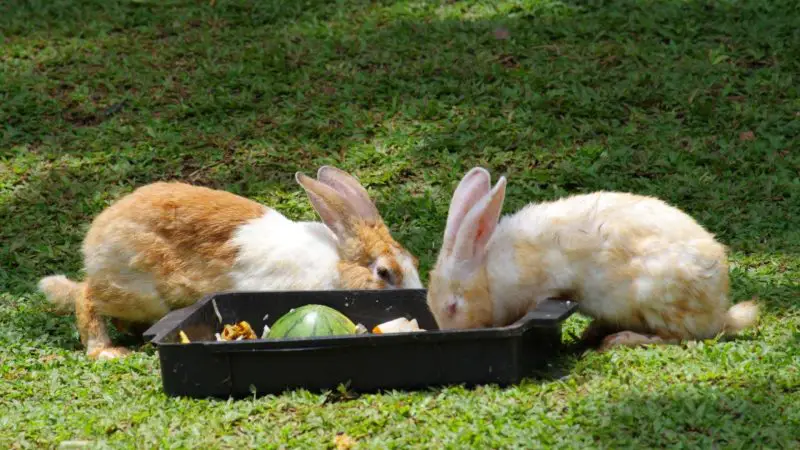
A rabbit’s diet should include hay, fresh vegetables, and fruits, as well as rabbit pellets. Because rabbits have delicate digestive systems, a change in food can be introduced gradually to allow the rabbit to adapt.
A rabbit’s diet should include hay, fresh vegetables, and fruits, as well as rabbit pellets. Because rabbits have delicate digestive systems, a change in food can be introduced gradually to allow the rabbit to adapt.
Guinea pigs, like rabbits, require a well-balanced diet of hay, fresh fruits and vegetables, and pellets. Every day, your guinea pig needs an endless supply of orchard grass or timothy hay, freshwater, guinea pig pellets, and a variety of fruits and vegetables.
Guinea Pig Food Diet
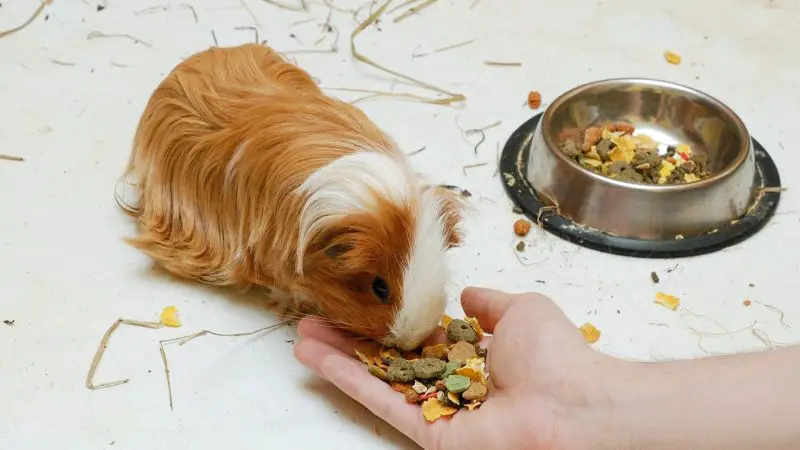
Guinea pigs, like rabbits, require a well-balanced diet of hay, fresh fruits and vegetables, and pellets. Every day, your guinea pig needs an endless supply of orchard grass or timothy hay, freshwater, guinea pig pellets, and a variety of fruits and vegetables.
Vitamin C is required in guinea pig food. Vitamin C may be given to your guinea pig through fresh fruits and vegetables, as well as commercial pellets.
In addition, guinea pigs, like rabbits, are unable to metabolize high-sugar foods, which leads to diabetes, obesity, and other chronic diseases that shorten your pet’s lifetime.
Food Requirements of a Guinea Pig and a Rabbit
Rabbit Food Requirements
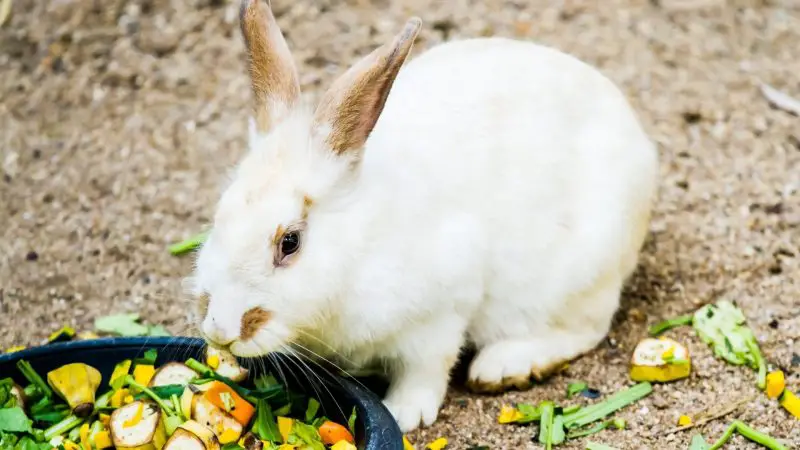
Considering these two animals’ nutritional needs can help you cater to their food requirements effectively. Rabbits need the following food requirements:
- Fiber – 18%
- Protein – 16%
- Calcium – 1% or less
Guinea Pig Food Requirements
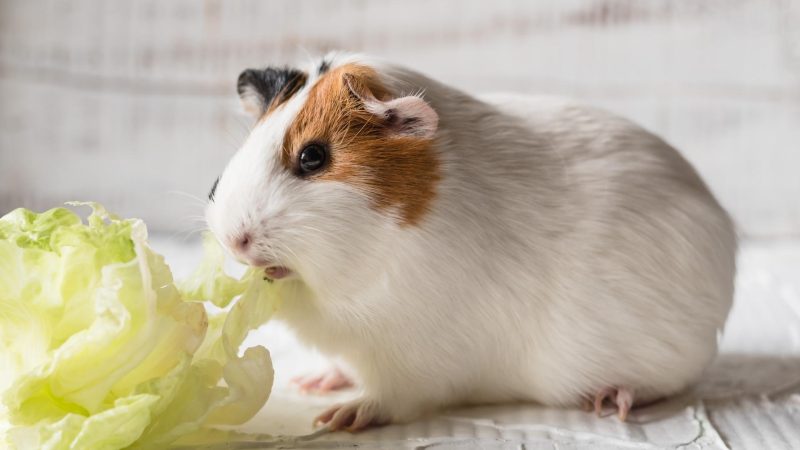
Guinea pigs have quite different nutritional requirements. They need the following food requirements:
- Fiber – 10-16%
- Protein – 18-20%
- Calcium – 1% or less
- Vitamin C – 25-50 mg
Risks to Consider When Feeding Rabbit Food to Guinea Pigs
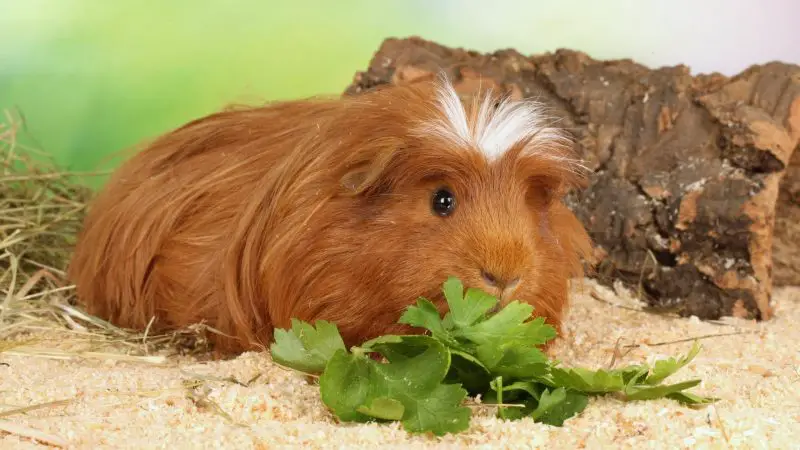
Giving your guinea pig rabbit food not only deprives it of vitamin C, risking its immunity but also poses the following risks:
Choking Hazard
Some rabbit foods present a potential choking threat to guinea pigs. Foods such as seeds and nuts can cause your cute little pet to choke.
If not handled properly, it can cost the life of your guinea pig. Cavies naturally don’t feed on seeds and nuts. The passage of food for rabbits and guinea pigs differs.
Allergic Reactions
Guinea pigs don’t have a robust immune system. Thus, they are prone to diseases and infections, including allergic reactions. These are brought by foods that do not go well with their digestive system.
Some rabbit foods can lead to allergic reactions in guinea pigs. This is present through vomiting or even diarrhea and can affect how your pet feels.
In case you notice anything that is not normal in your guinea pig, you can offer your guinea pig a lot of water and later, simply avoid that food. If the situation worsens, then you need to visit a qualified vet for assistance.
Too Much Fat and Protein
Some foods that rabbits eat have excess fats and proteins in them. These two nutrients are essential but not needed in large portions.
Unfortunately, the consumption of foods that have too many fats and protein can jeopardize your guinea pig’s health and cardiovascular strength.
Besides, you don’t want your guinea pig to grow so big through gaining unnecessary weight after consuming foods that are rich in excess fats and protein. You should have a guinea pig that has a balanced weight which also contributes to its well-being and health.
Illnesses and Defects
Due to the absence of several nutrients in rabbit foods, the consumption of this by guinea pigs opens up an avenue for both diseases and deformities.
For instance, scurvy is one illness that will be experienced when your guinea pig is on a rabbit’s diet plan. This illness is caused by a vitamin C deficiency in its body.
Another problem or defect that your guinea pig may experience by eating rabbit food is stunted growth, especially for the bones.
A gap in calcium levels opens up a risk of poor bone structure and growth. In some cases, rabbit food lacks vitamin K which is vital for the synthesis of calcium.
Presence of Antibiotics
Some rabbit foods have antibiotics that can harm guinea pigs. This is a big deal. There are several types of antibiotics, but the most popular one is the penicillin-based antibiotic that is very harmful to guinea pigs.
If not taken care of, it can lead to death for your pet. This is something you don’t want to witness. You can prevent all of this by not feeding your guinea pig the rabbit food.
Some Rabbit Foods Destroys Beneficial Bacteria in Guinea Pigs
Although not all, some of the foods that rabbits eat, when given to guinea pigs, can lead to the clearance of vital bacteria in your pet. Guinea pigs depend on certain bacteria found inside the stomach for essential purposes and roles in their lives.
These bacterias help the guinea pig to digest food since cavies have a weak digestive system that cannot digest foods on their own. Another reason why guinea pigs need these bacterias is to extract nutrients from food, something that they find hard to achieve independently.
Quick Facts on Rabbits
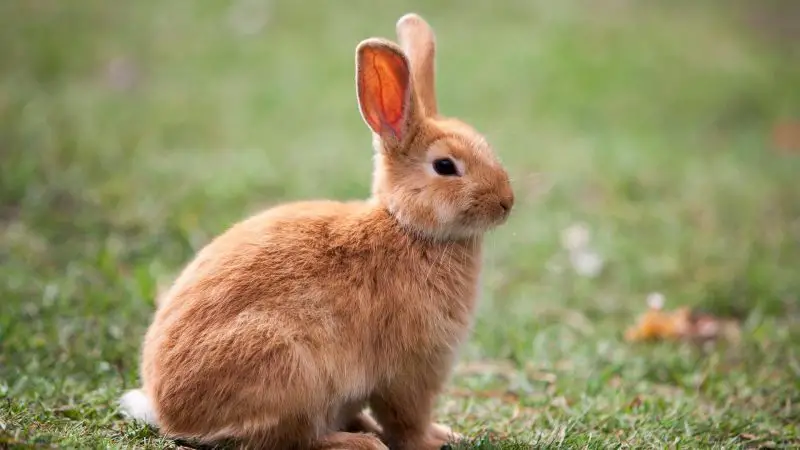
We do know that rabbits have a close relationship with guinea pigs, even though their diets differ. However, you may not be aware of the following quick facts about rabbits:
- Contrary to popular belief, rabbits live better without carrots. Food comes to your mind immediately when you spot a rabbit somewhere are carrots. As much as cartoons and movies have that rabbits love and live on carrots, this is not the case when it comes to reality. Carrots contain too much sugars and are better used as snacks but not as meals.
- The young ones of rabbits are referred to as kittens.
- A female rabbit is known as a doe, while a male one is called a buck.
- Rabbits live together in groups. This is what you should do if you own several, group them.
- Most of the rabbits in the world, almost half of the entire population, live in North America.
- These pets can live for up to 10 years.
- Rabbits have long ears that can grow up to 10cm.
- The reproduction cycle of rabbits is rapid, making it a bother for those who consider them as pests.
- A kitten is born without fur and with the eyes closed.
- When happy, a rabbit will binky. You can notice this if you carefully examine the pet.
- Funnily, rabbits are among the few animals in the world that eat their poop.
- Rabbits cannot vomit.
- They have a near 360 degrees vision.
- Rabbits are good at jumping.
- They have teeth that grow throughout their lifetime.
- Rabbits’ ears aid them in staying cool always.
- It is not easy to catch a rabbit when chasing one.
We have also made a full list of foods that guinea pigs can and can’t eat (150+ Types of Foods). Be sure to also check our recommended products page for everything you will ever need to assure a happy life for your guinea pigs. Hope this information was helpful and you have found the answer you were looking for.
List of Sources
How to Care For Your Pet Guinea Pig
Vitamin C Requirements of the Guinea-Pig
Diet Composition and Mineral Balance in Guinea Pigs
Some Determinants of Intake and Patterns of Feeding in the Guinea Pig
